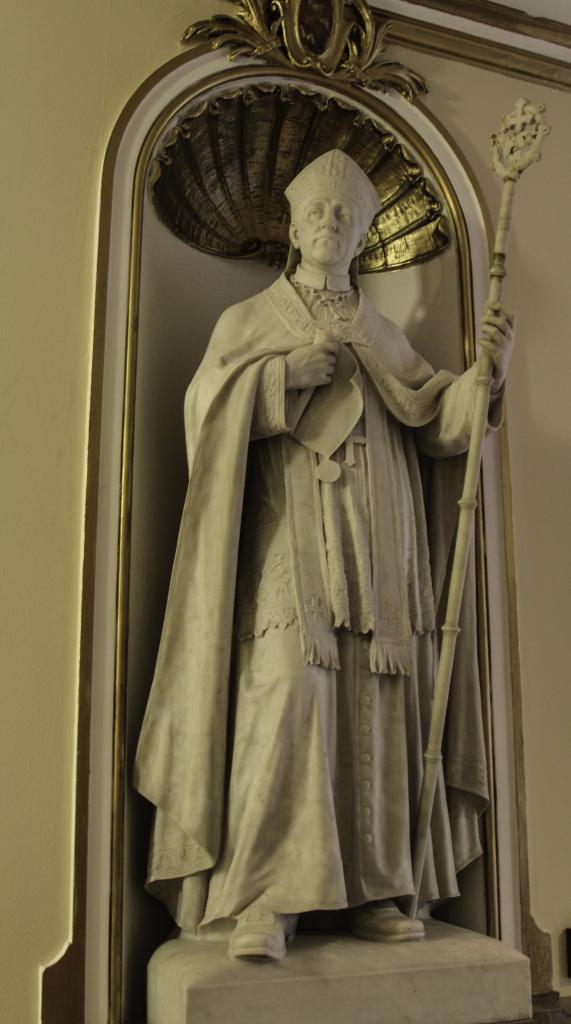Turibius was the second son of the Lord of Mogrovejo, born in Spain on 16th November 1538. From childhood he had a strong inclination to prayer. In his playtime he was known to adorn altars. He always strove to serve the poor, often giving away his dinner to the less fortunate. Turibius frequently fasted and prayed, eventually developing the habit of praying the Rosary along with the Little Office of the Blessed Virgin Mary.
He was raised in a religious household but never felt a calling to the religious life. Instead, he studied law and became a professor at the distinguished University of Salamanca. He was brought to the notice of King Philip II of Spain, who honoured him with several dignities and appointed him as chief judge of the ecclesiastical court of the Inquisition at Granada, Spain. Turibius held office for five years with much integrity, prudence and virtue. People of the kingdom were impressed with his intellect and the manner in which he admirably conducted the affairs of the court.
At this time, the Church in Peru was in its infancy and required an Archbishop with the seat having fallen vacant. The Church faced a challenge to find an honest man who could fill the position, remain above corruption, reprimand sinners and evangelise the natives. The arrangement for centuries between Spain and the Holy See was that the Spanish Crown chose bishops while the Pope approved, or rejected them. King Philip II appointed Turibius as Archbishop of Lima. Turibius tried to convince the king that he was not fit for this role: he was a layperson and not a priest, he had never asked for the appointment, and had never travelled to South America. He cast himself at the foot of the Crucifix, praying with tears for God to take away this burden which he thought was beyond his capability. After the Pope approved the appointment, Turibius received the four minor orders on four successive weeks, was ordained a deacon and then a priest. He said his first Mass when he was over 40 years old. In 1581, Turibius was ordained as Archbishop of Lima.
Turibius sailed to a new world to a diocese that spanned over 400 miles along the coast. He visited every parish in his diocese which took seven years. He stayed two to three days at each place, many a times going without proper food and sleeping on dirty floors. At every parish, he gathered people to celebrate the sacraments. He preached on God’s love and how to follow Jesus.
His journeys were dangerous as he passed through areas inhabited by wild animals and diseases. In his travel he was met with corruption, greed and inhumane treatment. The natives were being exploited by Spanish colonists who were squandering the land and priests that were filling their own pockets. In some cases, priests had joined Spanish leaders in oppressing the people. Locals were baptised but had no idea of Christianity as there was no catechism or Bible available in local languages. St Turibius started learning different languages spoken by the natives so that he could teach them in words they could understand.
He gathered Bishops for the Third Council of Lima. They decided to print the catechism in native languages, setting up classes for those in need, regulating sacraments and reforming priests. He spent his life baptising and confirming people, building hospitals, schools and roads. His efforts in baptising which was central to his mission bore good fruit with a higher number of conversions taking place in Peru. It is said that in his lifetime, Turibius baptised close to half a million people.
Nine years into his episcopacy, with the support of his fellow priests and local community, St Turibius opened the first seminary in Peru, the seminary of Lima Santo Toribio de Mogrovejo on 7th December 1590. He said the Holy Mass every day with great fervour and confessed every morning to his chaplain. Among those to whom he gave the Sacrament of Confirmation were St Rose of Lima, St Martin de Porres, and St John Massias.
Although poor, people were sensitive to alms being given openly. St Turibius raised funds privately, donating it anonymously to avoid hurting the sensibilities of the poor. St Turibius worked unceasingly to bring people out of their poverty. He changed the landscape of Lima, from a place of oppression to a more just society.
At the age of 68, he fell sick during one of his missionary travels. He ordered that all his belongings be given away to the poor of Lima. He asked to be taken to the nearest church to receive the Eucharist and was given the Sacrament of Anointing of the Sick. He died on 23rd March 1606. St Turibius was canonised on 10th December 1726 by Pope Benedict XIII and is the patron saint of native people’s rights, Latin American bishops and the country of Peru.




